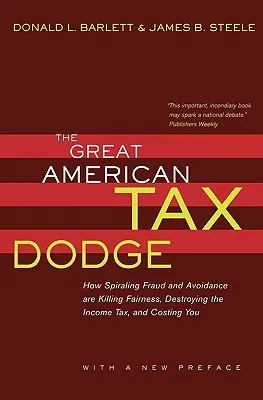The Great American Tax Dodge: How Spiraling Fraud and Avoidance Are Killing Fairness, Destroying the Income Tax, and Costing You
By (author): "James B. Steele, Donald L. Barlett"
Publish Date:
August 1st 2000

ISBN0520236106
ISBN139780520236103
AsinThe Great American Tax Dodge: How Spiraling Fraud and Avoidance Are Killing Fairness, Destroying the Income Tax, and Costing You
Original titleThe Great American Tax Dodge: How Spiraling Fraud and Avoidance Are Killing Fairness, Destroying the Income Tax, and Costing You
In The Great American Tax Dodge, a book that should infuriate and galvanize citizens everywhere, the best-selling authors of America: What Went Wrong? expose the millions of Americans who are dodging their income taxes at every honest taxpayer's expense. With the clarity, insight, and readability that earned them two Pulitzer Prizes, Donald Barlett and James Steele explain how Americans are cheating as never before, and why most are getting away with it.The authors relate the stories of a Manhattan couple who spent $1 million a month to maintain their lifestyle yet never paid income tax, a California couple who provided sport utility vehicles for their children at taxpayers' expense, an entrepreneur in Costa Rica who shows Americans how to hide their money in clandestine accounts offshore, and computer technicians at America's largest corporations who live tax-free.Barlett and Steele describe how the Internet has democratized tax cheating, as proliferating Web sites and their often mysterious operators offer every service imaginable to escape taxes. They discuss the double standard the IRS employs in tax audits--one for the rich and well-connected and another for everyone else--and how the Justice Department tries to jail powerless citizens accused of tax law violations while allowing the wealthy and influential to go free. This book also documents how Congress is deliberately undermining the income tax in order to replace it with a system that will provide the largest windfall ever for the richest Americans--and increase the burden on everyone else. And it spells out how executives like Kenneth L. Lay bankrolled campaigns to institute such a tax system, based on accounting principles eerily similar to those employed at Lay's Enron Corporation. Finally, the authors consider our chances for reestablishing what was once the fairest tax system in the world.